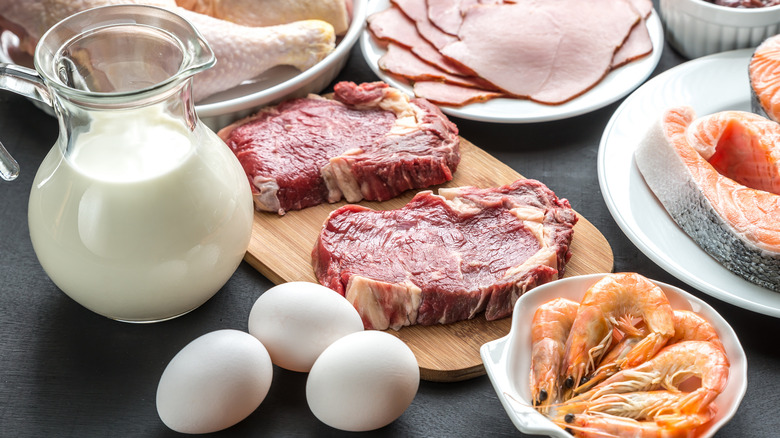Study Reveals What Could Be The Best And Worst Foods For Type 2 Diabetes Risk
Navigating type 2 diabetes can be difficult, especially when it comes to identifying foods that are safe to eat. Experts have known for some time that sugary drinks and cereals, processed grains like white rice, white bread, canned vegetables with added sodium, fried meat, deep-fried meats, large amounts of saturated fat, and just about anything made with trans fat are unhealthy choices. On the other hand, plant-based protein, fresh vegetables, beans, legumes, fish, seafood, chicken, leafy greens, and unsweetened drinks are better choices (via WebMD).
Thankfully, ongoing research helps us understand more about how certain foods affect diabetics. New research being presented at the annual meeting of the European Association for the Study of Diabetes in Stockholm, Sweden, is giving us more information about how some foods impact diabetes. In a press release, Dr. Annalisa Giosuè from the Department of Clinical Medicine and Surgery at the University of Naples Federico II said that the study provides "one of the highest levels of evidence available in medicine."
Dairy and red meat were a primary focus
The research showed that about 7 ounces of milk per day was linked with a 10% risk reduction of developing type 2 diabetes, and just under 4 ounces of yogurt was associated with a 6% risk reduction. A cup of total dairy and low-fat dairy were linked to a 5% and 3% reduced risk of developing the disease, respectively. The report also found that cheese and full-fat dairy had no effect on risk. Giosuè said that the nutrients, vitamins, and other bioactive compounds in dairy products may have a positive effect on how the body metabolizes glucose. In addition, the probiotics in yogurt are known to be beneficial when it comes to how the body breaks down sugar.
However, the findings also showed that consuming 3.5 ounces of meat daily — especially red meat — could raise the risk of diabetes. This includes processed meat, such as bacon, sausage, and deli meat. Dr. Giosuè said that meat contains saturated fat, haem iron, and cholesterol, all of which might lead to inflammation and interfere with how the body reacts to insulin. Moreover, meats contain nitrates, which can damage the pancreas cells needed to metabolize insulin. "White meat, in comparison, has a lower fat content, a more favorable fatty acid profile and a lower amount of haem iron," she added in the press release.


